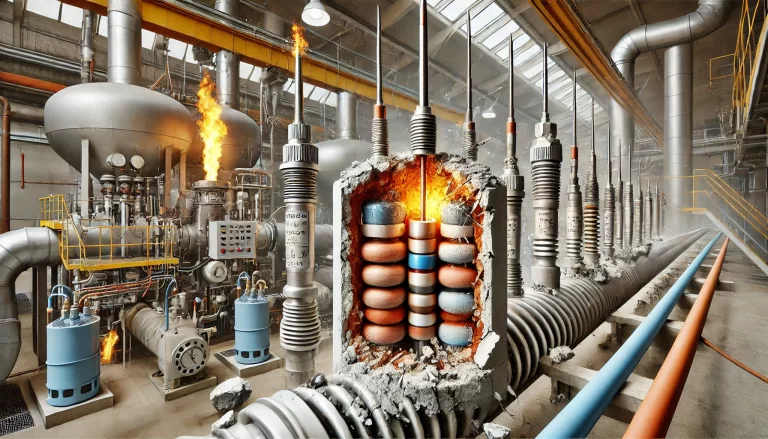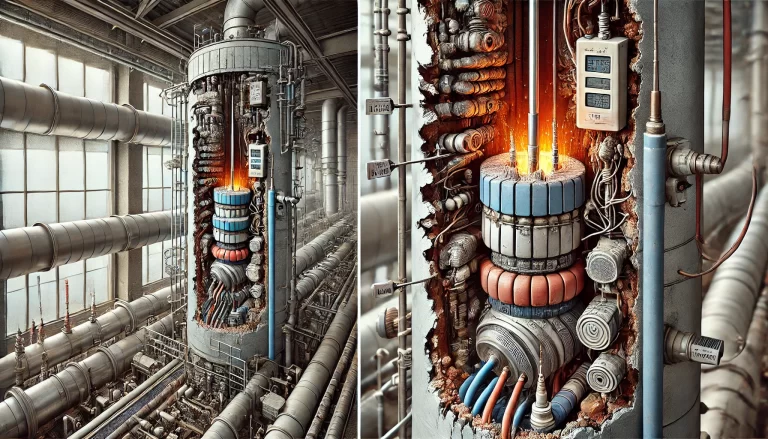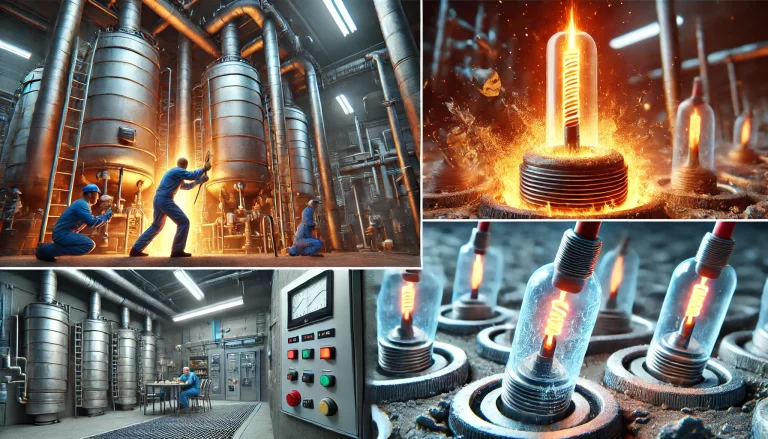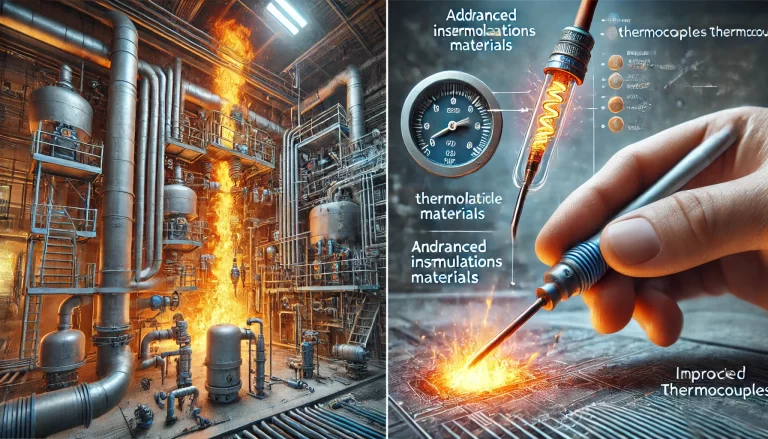Introduction
In industrial applications such as boilers, thermocouples are commonly used to monitor and control temperature. These sensors are essential for maintaining optimal operations and ensuring safety by providing accurate temperature readings of critical areas within the boiler. However, in high-temperature environments, especially during the startup phase of boilers, thermocouples often face specific challenges that can lead to frequent failures.
One key factor in their protection is the use of insulators, which help mitigate the harsh conditions. Despite these protective measures, frequent burnouts are reported during the early phases of boiler operation. This article explores why thermocouples require insulators and delves into the common causes of their failure during boiler startups.
The Role of Thermocouples in Boilers
Thermocouples are temperature sensors composed of two different metal wires joined at one end. When exposed to temperature changes, a voltage is generated at the junction, which is used to measure temperature. Thermocouples are highly valued in industrial applications due to their wide temperature range, durability, and relatively low cost.
In boiler applications, thermocouples are typically used to monitor temperatures in the furnace, heat exchangers, and gas exhaust systems. Accurate temperature measurement is vital for controlling fuel combustion, optimizing energy efficiency, and ensuring the safety of the boiler system. However, the extreme environment inside a boiler, especially during startup, presents numerous challenges for these sensors.

Why Insulators are Essential for Thermocouples
Thermocouples in boiler environments require insulators for several critical reasons:
Protection from Corrosive Gases and Chemicals: Boilers generate combustion gases, many of which are corrosive, such as sulfur compounds, oxygen, and steam. These gases can chemically react with the materials of the thermocouple, degrading its performance over time. Insulators act as a barrier that prevents direct contact between the thermocouple and the corrosive environment, thereby extending the lifespan of the sensor.
Prevention of Electrical Interference: Boilers often operate with high-power electrical equipment, which can generate electromagnetic interference (EMI). Such interference can disrupt the weak voltage signal generated by the thermocouple, leading to inaccurate temperature readings. Insulators shield the thermocouple from these external electrical fields, ensuring that the signal remains accurate and stable.
Thermal Protection: The startup of a boiler can cause rapid temperature fluctuations. If a thermocouple is exposed directly to high temperatures without adequate insulation, thermal shock can occur. This leads to material stress, which can cause cracks or other physical damage. The insulator helps by gradually buffering the thermocouple from sudden temperature changes, minimizing the risk of thermal shock.
Mechanical Protection: Insulators also provide physical protection to the thermocouple. The harsh environment inside a boiler can cause mechanical damage due to vibrations, pressure variations, and contact with solid particles. Insulators prevent such direct physical impact, preserving the structural integrity of the thermocouple.

Common Causes of Thermocouple and Insulator Failures During Boiler Startup
Despite the use of insulators, it is common for thermocouples and their insulators to experience frequent burnout during the boiler startup phase. This can be attributed to several factors:
Thermal Shock During Rapid Temperature Rise: During the startup of a boiler, the temperature can increase from ambient levels to several hundred degrees within a short period. If this rise is too rapid, the thermocouple and its insulator may not be able to handle the sudden expansion and contraction of materials. The result is often cracking or complete failure of the sensor. Even though startup temperatures (such as 700-800°C) may seem moderate for high-temperature thermocouples, the rate of temperature increase is critical. Insulators, while protective, may fail to buffer these rapid changes effectively.
Chemical Corrosion at Startup: At the beginning of a boiler’s operation, incomplete combustion may occur, producing a higher concentration of corrosive gases such as sulfur dioxide (SO2) or hydrogen sulfide (H2S). These gases can corrode both the thermocouple and its insulator, especially if the protective layer of the insulator has already suffered wear and tear. The accumulation of corrosive substances during each startup cycle can gradually weaken the materials, leading to premature failure.
Electrical Issues Due to Poor Grounding or Insulation Breakdown: Boilers can produce significant electrical noise, especially during ignition or when large motors and pumps are engaged. If the insulation of the thermocouple is compromised, this electrical interference can cause signal disruption or even short circuits. This is particularly problematic if grounding is not properly maintained. Over time, repeated electrical stress may degrade the insulator material, leading to eventual burnout.
Material Fatigue Due to Repeated Cycles: Boilers often undergo repeated heating and cooling cycles during startup and shutdown phases. These thermal cycles can lead to material fatigue in both the thermocouple and its insulating sheath. As the materials expand and contract repeatedly, microcracks can form. Eventually, these cracks propagate, causing the sensor and its insulator to fail.
Improper Installation or Insufficient Protection: Sometimes, the root cause of frequent thermocouple failures lies in improper installation. If the thermocouple is placed too close to direct flame or improperly shielded from high-velocity gases, it may be exposed to more intense heat and physical stress than it is designed to handle. Similarly, if the insulator is not appropriately rated for the operating conditions or is inadequately fitted, it may fail to provide the required level of protection.

Solutions to Prevent Thermocouple and Insulator Burnouts
To reduce the risk of thermocouple and insulator failures during boiler startup, several measures can be implemented:
Use of High-Quality, Temperature-Rated Thermocouples: Ensuring that thermocouples are appropriately rated for the maximum operating temperature of the boiler is crucial. Additionally, selecting materials with high resistance to oxidation and corrosion (such as Inconel or platinum-based alloys) can help extend the sensor’s life.
Improved Insulation Materials: Insulators made from advanced ceramics or metal alloys with better thermal and chemical resistance can provide more durable protection. These materials should be selected based on the specific environmental conditions of the boiler, including temperature range, presence of corrosive gases, and exposure to vibrations.
Slower Temperature Ramp-Up During Startup: Gradually increasing the temperature during boiler startup can help minimize thermal shock to the thermocouple and its insulator. Automated control systems can be employed to ensure a controlled and steady temperature rise, reducing the likelihood of rapid temperature fluctuations.
Regular Maintenance and Inspection: Regular inspection of the thermocouple and its insulation is vital. Identifying and replacing worn or damaged components early can prevent failures. Periodic cleaning of the thermocouple surface and checking for signs of corrosion or mechanical wear can also prolong its operational life.
Proper Grounding and Electrical Shielding: Ensuring that the boiler system is properly grounded and that the thermocouple is adequately shielded from electromagnetic interference can prevent electrical issues that lead to sensor burnout. Regular checks of the electrical integrity of the insulation and grounding connections are important.

Conclusion
Thermocouples play a critical role in monitoring and controlling temperature in boilers, but the harsh conditions during boiler startup present significant challenges to their longevity. While insulators provide necessary protection from thermal, chemical, and electrical threats, frequent failures can still occur due to a combination of rapid temperature changes, corrosion, electrical interference, and material fatigue.
By selecting high-quality materials, controlling startup procedures, and implementing regular maintenance, the risks of thermocouple and insulator burnout can be greatly reduced, ensuring reliable and safe boiler operations.
